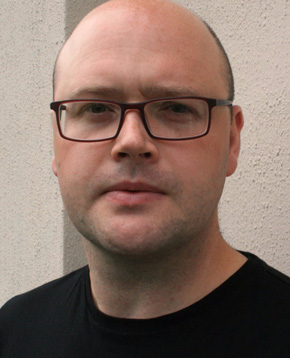Going deeper
by Ian ParkinsonDigging a grave on a cold, rainy morning in winter certainly focuses the mind. Human beings tend to die in the winter. You learn this when you are a gravedigger and things have been picking up since the autumn. As with so many professions, there is more to do at Christmas.
I was asked if I’d like to do the job by my uncle, the vicar of a church not then far from my house. I was good with a spade having worked as a labourer for a number of years. There is a certain technique to acquire – a way of doing things. A small spade is best, with a handle smoothed by use so that it moves easily through your hands. I write about this in my first novel The Beginning of the End, where a character called Raymond is left a villa that is surrounded by dunes on the Belgian coast and he is forced to dig out the perimeter wall day upon day upon day, the sand always blowing in drifts and threatening to bury the entire house.
Of all the many jobs I have done, grave digging was the only one able to put me into that unusual state of mind necessary for me to write. Neither happy nor sad, but somewhere in between.
Everything else left me either too mentally or too physically exhausted to write. Polishing bolts at a factory is possibly the worst job I have ever done – although there are so many. Cleaning plastic crates with a hosepipe at a bread factory also comes to mind, a seasoned co-worker saying within minutes of meeting me for the first time on my first day that “this is going to be the worst job you will ever do.” He didn’t laugh, and I don’t think I did either.
I also stuck labels on cardboard files for six months in my first position within the civil service; everyday, all day long, the first three letters of what seemed like a million surnames so that a particular file could be easily picked from a warehouse of files. I was the only person doing the job, but for some reason I seem to remember quite liking it, if only because I could feel my mind beginning to warp into a delirious abstraction by the end of each day.
In the evenings I wrote a screenplay about a man who was driven insane by a tedious office job, but the screenplay, like so much else that I have written, found its way into the bin without ever being seen by anyone but me. Besides, I’d just wanted to write a film like The Machinist.
The old-fashioned typewriter was, of course, a pretension. As was the knitted, vaguely alpine-patterned woollen jumper I wore for a short time in my late teens.”
That is how it happened with so much of what I wrote. Plagiarism has followed me everywhere. At that time I was writing on an old-fashioned typewriter that made such a clanking, thwacking din at the press of every key, everyone in the block of flats in which I lived must have known that I was trying to become a writer, or at least they knew that I was writing something.
The old-fashioned typewriter was, of course, a pretension. As was the knitted, vaguely alpine-patterned woollen jumper I wore for a short time in my late teens, purely because the writer played by Jack Nicholson in The Shining wears a knitted, vaguely alpine-patterned woollen jumper. I seem to remember writing a story at around this time about a man living in a large, empty mansion. And I certainly remember that when I wanted to write during my ‘woolly jumper period’, I would go to the wardrobe, put on my woolly jumper, take my old-fashioned typewriter from its case, and sit at the desk in my bedroom, hammering away at the keys – the clanking, thwacking sounds vibrating the very bricks of the house.
Odd though it is, my parents never thought to ask what I was doing, even when I went downstairs wearing my woolly jumper in summer.
Whether or not I was trying to unconsciously leak to the world my attempts to become a writer, I don’t know. I have always kept my writing to myself. I was probably in my late twenties before I told any of my friends that I wanted to be a writer. I only told my family a few months ago that I had written a novel and that it was going to be published and that some people thought it very good. Though none of them have, as yet, bought my novel.
Reading is not something that is done very often in my family. Certainly not the reading of novels. And so it is very strange that I should have wanted to become a writer in the first place. I don’t know. All of life is based on chance, and the smallest of things can irrevocably change your course.
For me, writing is a way of escape. The imagination seems inextricably linked with memory, although you would think them to be poles apart, buried somewhere deep within separate hemispheres of the brain.
I doubt that I was very different from any other child, except that I was perhaps a little more keen than most on the writing of stories. Most of all, I loved to listen to the stories my grandmother would tell me, making them up as she went along, all of them with me and her as the central characters on some adventure or other.
All that has remained is perhaps the love I still feel for her, and the memory of her opening the door into my own imagination, beyond which I found some kind of unquenchable thirst I will never be without.
When she died in front of me two years ago, I came home and finished a chapter of my book. I don’t why, but I was neither happy nor sad. Whatever I was feeling was somewhere beyond both. It reminded me of the feeling I would get when I was digging a grave – that curious state of the seriousness of things that is produced only by death.
It has been said that writers would sell their own mother for a story. But it is much worse than that.
 Ian Parkinson was born in Lancashire in 1978 and studied philosophy at university before working as a civil servant and insurance clerk. He has also worked as a gravedigger, a car salesman, a car paint mixer, a painter and decorator, a bolt maker, a railway engineer’s assistant, a machine cleaner in a bread factory, a bar assistant, a caravan maker, a door-to-door salesman, a labourer, and in a call centre – none of them for very long. The Beginning of the End is published in paperback by Salt. Read more.
Ian Parkinson was born in Lancashire in 1978 and studied philosophy at university before working as a civil servant and insurance clerk. He has also worked as a gravedigger, a car salesman, a car paint mixer, a painter and decorator, a bolt maker, a railway engineer’s assistant, a machine cleaner in a bread factory, a bar assistant, a caravan maker, a door-to-door salesman, a labourer, and in a call centre – none of them for very long. The Beginning of the End is published in paperback by Salt. Read more.
EXTRACT
Ian Parkinson: Strays and loners


